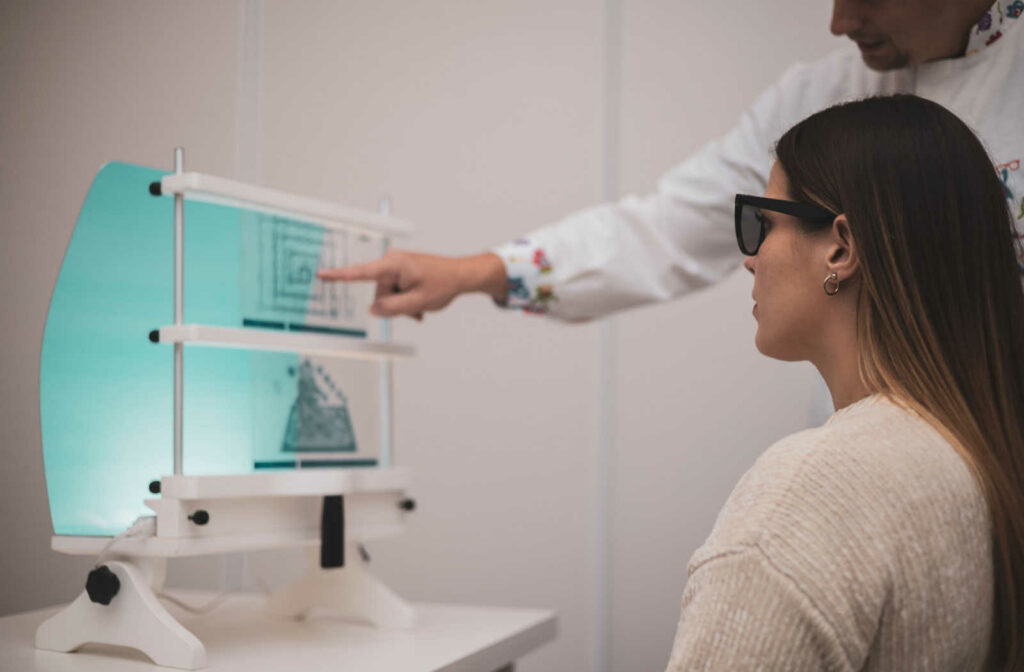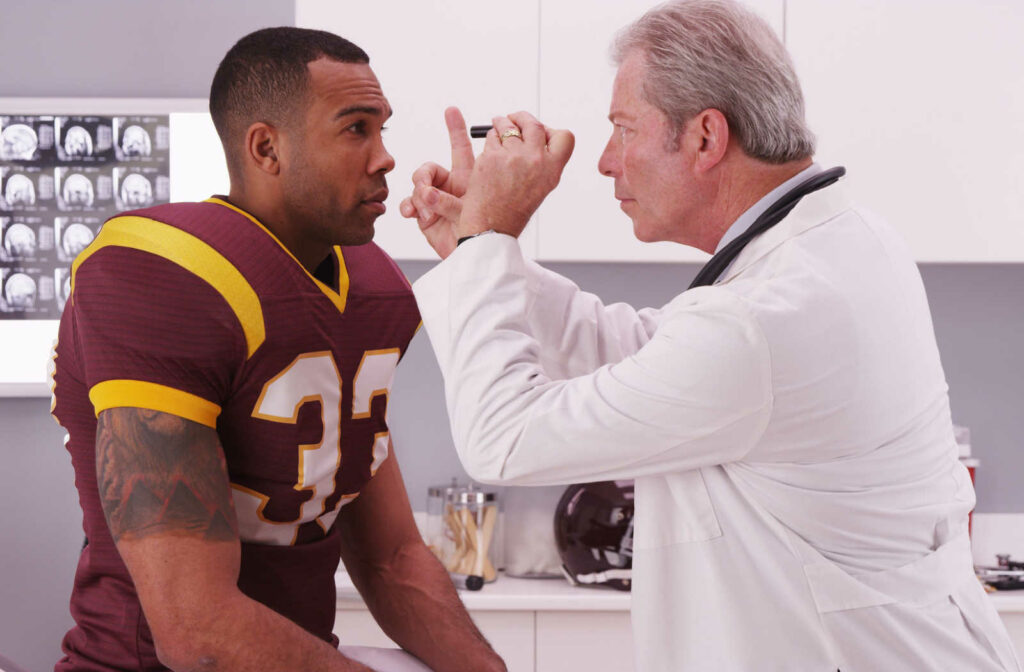Restoring Healthy Vision
Diagnosing vision problems after trauma is more than testing 20/20 vision. How clear your vision is may not reflect how well your visual system functions. Post-concussion vision therapy can help patients improve their visual skills. Improving how the brain manages visual skills is essential for achieving comfortable vision.
So how does a concussion affect vision? What can patients expect with vision therapy for a concussion?
What Is Vision Therapy?
Similar to how physical therapy helps patients maintain or develop mobility skills, vision therapy helps improve or restore visual skills. Vision therapy can benefit people of all ages. Like physical therapy, your care provider will personalize treatment for unique health or lifestyle needs.
Vision therapy uses various methods to train or correct aspects of the visual system. Healthy vision involves multiple structures, nerves, and tissue. Besides essential structures in the eye, vision also requires healthy neural pathways in the brain.
The human eye gathers visual information through light. Photoreceptor cells in the retina (located at the back of the eye) detect colour and light intensity. The optic nerve changes visual information gathered by the retina into electrical signals.
Next, the optic nerve sends those signals to the occipital lobe in the brain. There are 2 occipital lobes to interpret the separate signals from the left and right retinas. Finally, the occipital lobe turns those signals into images the brain can understand.
The neural pathways involved in vision interpret various aspects of vision, including:
- Colour determination
- Distance or depth perception
- Face or object recognition
- Movement tracking
- Memory information
When neural pathways are affected by abnormal development or injury, people can experience vision or perception difficulties. Vision therapy considers the entire visual system, the eyes and the brain, to help patients experience comfortable, healthy vision.
How a Concussion Impacts Vision
A concussion is an acquired brain injury occurring when the brain moves rapidly back and forth inside the skull. It can be caused by head, neck, face, neck, or body trauma. A concussion affects the way you think and feel.
Most people recover between 10 days to 4 weeks, with children experiencing more extended recovery periods than adults. However, everyone experiences a concussion differently. Concussion symptoms may develop within hours or days after an injury.
Although a concussion is considered a mild traumatic brain injury (MTBI), the ongoing symptoms can be debilitating and alter normal brain function. More than 60% of people with concussions experience visual symptoms.
Most vision problems experienced after a concussion are not associated with visual acuity (20/20 vision). Instead, the symptoms affect how your vision works, including eye teaming, focusing, and tracking.
Blurry vision is the most common symptom following a concussion, typically caused by eye misalignment when focusing on an object or target. However, various post-concussive visual symptoms relate to physiological or cognitive complications.
Some common visual symptoms include:
- Double vision
- Eye movement issues
- Headaches
- Light sensitivity
- Reading problems
- Vision loss

Vision Therapy vs Neuro-optometric Rehabilitation
Neuro-optometric rehabilitation uses vision therapy techniques to help treat brain-related vision problems, including symptoms caused by a neurological issue or traumatic brain injury (TBI).
Not all doctors who offer vision therapy are trained in neuro-optometric rehabilitation. Although both use similar methods, only an eye doctor with specialized training and clinical experience will provide post-concussion vision therapy.
It’s also critical that post-concussion vision therapy is part of an interdisciplinary, integrated team approach. Vision therapy is focused on visual symptoms and may not address all care needs, such as additional physical or emotional symptoms.
What to Expect
The therapy methods and optometric tools will depend on the patient’s symptoms and needs. Before therapy can begin, the eye doctor will evaluate the visual system. Then, the eye doctor will develop a strategy with a combination of in-office and at-home neuro-rehabilitation treatment.
Common strategies practiced in post-concussion vision therapy include:
- Patching: a patch is placed on one eye to help eliminate double vision.
- Prism lenses: a prism lens redirects light to help correct vision alignment and treat binocular vision problems, including double vision, dizziness, headache, and balance issues.
- Prescription glasses: unique glasses are designed to enhance visual comfort or compensate for vision problems related to the neural system.
- Vision therapy exercises: various exercises for improving visual skills, such as hand-eye coordination, eye tracking, peripheral vision, and depth perception.
The duration of vision therapy also depends on a patient’s needs and response to treatment.
Get in Touch for Vision Therapy
It’s never too late to get help with post-concussion therapy. Vision therapy can help rebuild connections between the brain and eyes to restore your vision.
At Avenue Optometry & Vision Therapy, we offer treatment for acquired brain injury or concussion through our extensive vision therapy program. After an evaluation and discussion, we’ll create your personalized treatment plan and guide you through vision rehabilitation. Please get in touch with us today to schedule an assessment with our North York Optometrist or to get more information.




